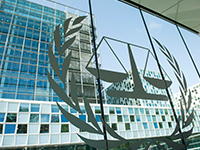On July 1st 2002 the Rome statute came into effect, forming the legal base of the International Criminal Court (ICC). From then on the ICC was able to arraign individuals for crimes of genocide, war crimes and crimes against humanity.
13 years later a few verdicts have been passed and it’s time to ask if the ICC fulfils its goals. Not only the offenders should be brought to justice, other goals of the ICC are to bring justice to the victims as well as to promote peace and security. How does this work (out) in reality? Is it possible to prosecute crimes against humanity in fragile states, where not even a police force or other investigative authorities exist? Are the victims being heard? To which extent can such a trial contribute to peace, consolidations and compensation? What about the individuals who once were victims and then became offenders themselves as the former child soldier Ongwen?
In the latest HSFK-Standpunkt 2/2016 "Von Uganda nach Den Haag. Der Internationale Strafgerichtshof und der Fall des ehmaligen Kindersoldaten Dominic Ongwen" Clara Braungart takes a close look at the charges pressed against the Ugandan rebel leader and former child soldier Dominic Ongwen. She analyses to what extent the victims come into play of the trial, how the Ugandan society reacts to it and the role of the Ugandan government. Her results are disillusioning. Therefore Clara Braungart works out some advice how the victims and the countries can profit more from the work of the ICC.
The HSFK-Standpunkt is available as free download (German only).
